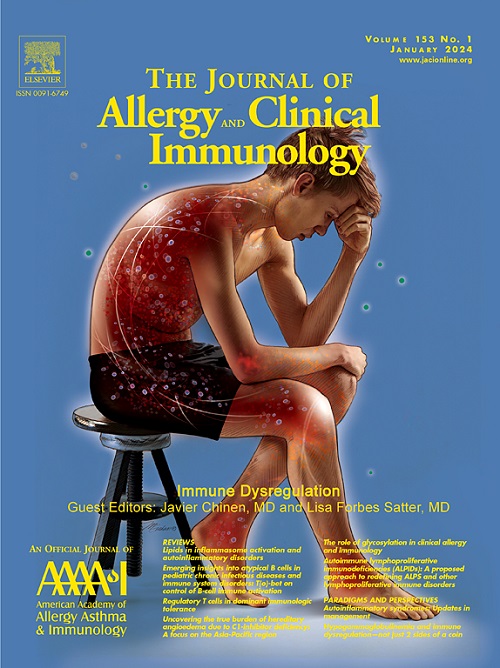Effect of mepolizumab in airway remodeling in patients with late-onset severe asthma with an eosinophilic phenotype
IF 11.4
1区 医学
Q1 ALLERGY
引用次数: 0
Abstract
Background
Clinical trials and real-world experience have provided evidence for the clinical benefits of mepolizumab, an anti–IL-5 biologic, in severe asthma. However, limited data exist regarding the impact of mepolizumab on airway remodeling.
Objective
We sought to investigate the effect of mepolizumab on airway structural remodeling in patients treated for severe asthma in routine clinical care.
Methods
The MESILICO (Efficacy of Mepolizumab in patients with latE-onset Severe eosInophiLic asthma and fIxed obstruCtiOn) study is a multicenter study involving 8 pulmonology departments in Greece. This study focused on patients who initiated mepolizumab for severe asthma with an eosinophilic phenotype and had late-onset disease with obstructive patterns (impaired reversibility). Forty-seven patients were recruited, of whom 41 were enrolled in the bronchoscopy substudy. The findings were related to clinical outcome.
Results
After 12 months, mepolizumab treatment was associated with significant improvements in lung function and Asthma Control Test score, along with a significant decrease in severe exacerbation events (P < .001). Thirty-four of the 41 participants (83%) had paired biopsies for comparative analysis. There was a significant reduction from baseline in sub-basement membrane thickness, airway smooth muscle area, airway smooth muscle layer thickness, extent of epithelial damage, and number of tissue eosinophils (all P < .001). The extent of reduction in airway smooth muscle layer thickness positively correlated with the submucosal eosinophil reduction (r = 0.599; P < .001).
Conclusions
This study identified that 12 months of mepolizumab treatment in patients with late-onset severe asthma, who are also characterized by eosinophilic and impaired reversibility phenotypes, not only leads to clinical improvement but also reduces indices of airway tissue remodeling suggestive of a disease-modifying effect.

美泊利珠单抗对晚期重症嗜酸性粒细胞表型哮喘患者气道重塑的影响
背景:临床试验和实际经验证明了抗IL-5生物制剂mepolizumab对重症哮喘的临床疗效。然而,有关甲泼尼单抗对气道重塑影响的数据却很有限:因此,我们研究了在常规临床治疗中,mepolizumab 对重症哮喘患者气道结构重塑的影响:MESILICO是一项多中心研究,涉及希腊的8个肺部科室。这项研究的重点是因嗜酸性粒细胞表型的重症哮喘而开始使用美泊利珠单抗治疗的患者,这些患者发病较晚,并伴有阻塞模式(可逆性受损)。共招募了 47 名患者,其中 41 人参加了支气管镜子研究。研究结果与临床疗效相关:结果:12 个月后,甲泼尼单抗治疗可显著改善肺功能和 ACT 评分,并显著减少严重恶化事件(p):这项研究表明,对同时具有嗜酸性粒细胞和可逆性受损表型的晚发性重症哮喘患者进行 12 个月的美泊利珠单抗治疗不仅能改善临床症状,还能降低气道组织重塑指数,这表明该药物具有疾病调节作用。
本文章由计算机程序翻译,如有差异,请以英文原文为准。
求助全文
约1分钟内获得全文
求助全文
来源期刊
CiteScore
25.90
自引率
7.70%
发文量
1302
审稿时长
38 days
期刊介绍:
The Journal of Allergy and Clinical Immunology is a prestigious publication that features groundbreaking research in the fields of Allergy, Asthma, and Immunology. This influential journal publishes high-impact research papers that explore various topics, including asthma, food allergy, allergic rhinitis, atopic dermatitis, primary immune deficiencies, occupational and environmental allergy, and other allergic and immunologic diseases. The articles not only report on clinical trials and mechanistic studies but also provide insights into novel therapies, underlying mechanisms, and important discoveries that contribute to our understanding of these diseases. By sharing this valuable information, the journal aims to enhance the diagnosis and management of patients in the future.

 求助内容:
求助内容: 应助结果提醒方式:
应助结果提醒方式:


